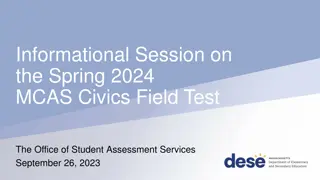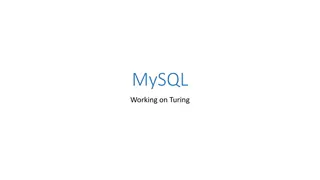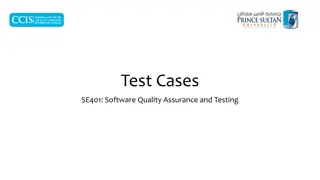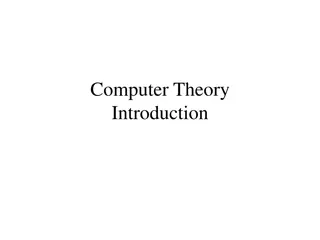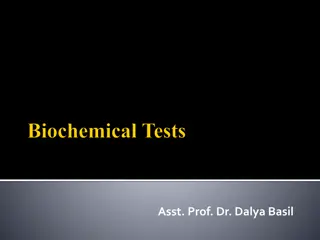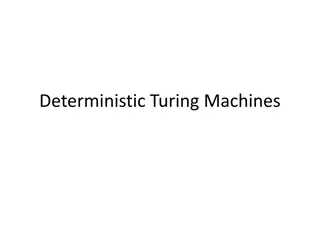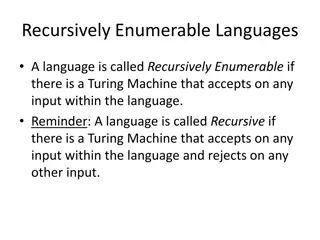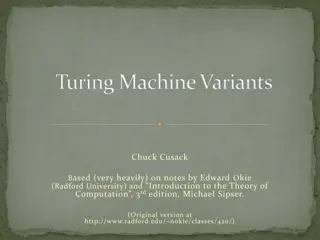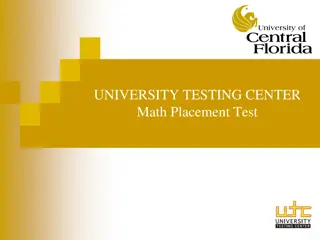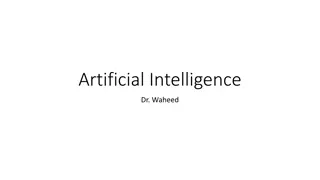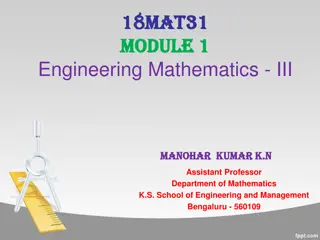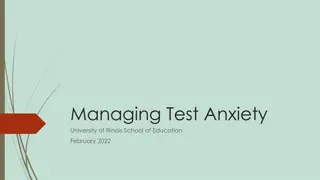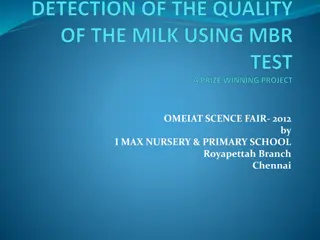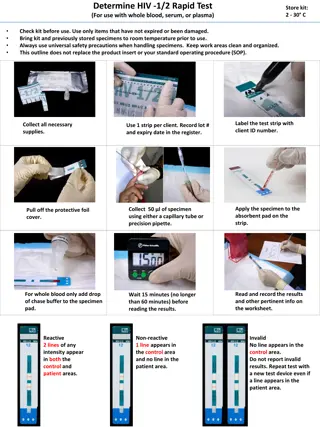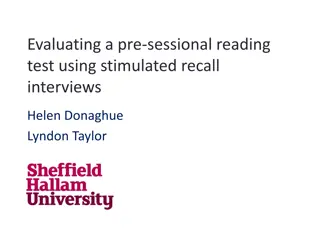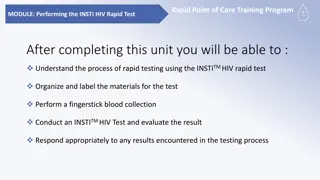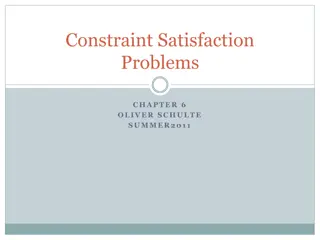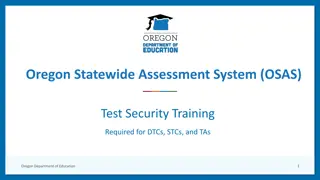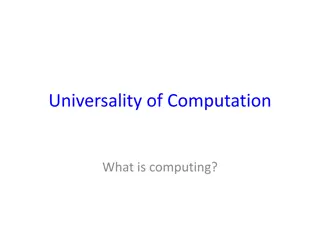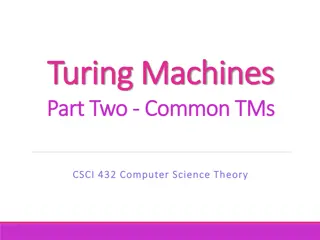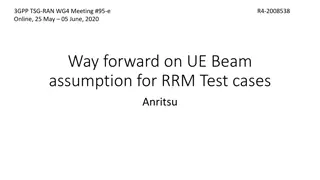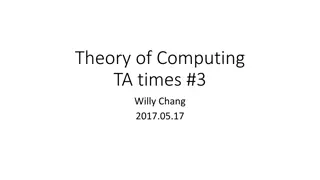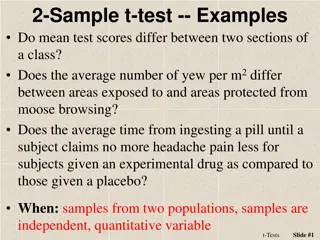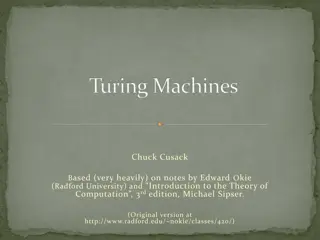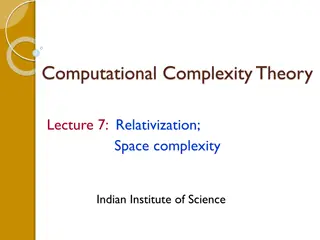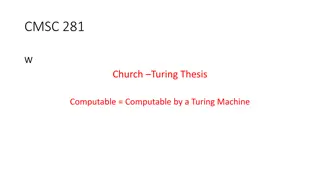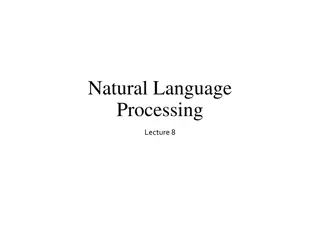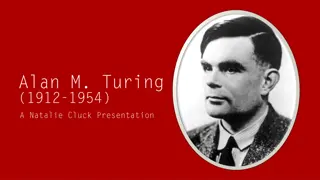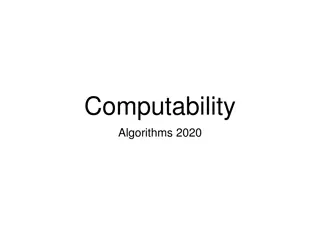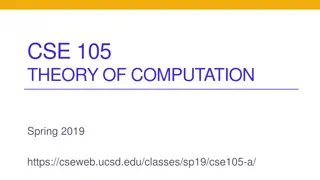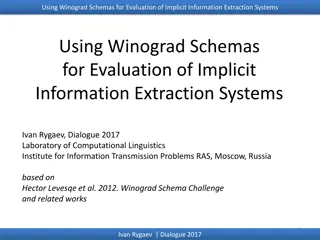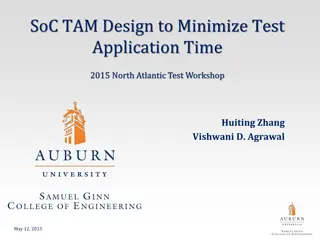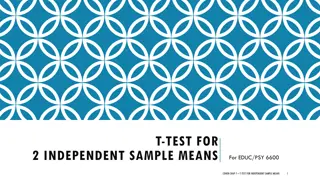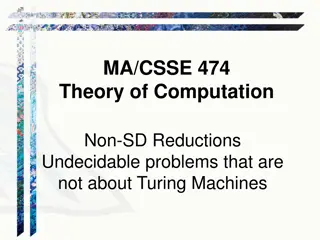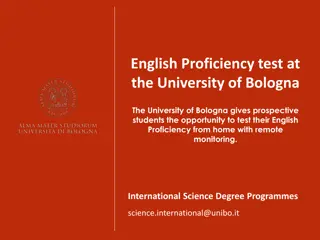Understanding Advertising Media Effectiveness
Advertising effectiveness is crucial for brands to assess the impact of their marketing efforts on target audiences. By measuring strengths, weaknesses, and ROI of advertising campaigns, companies can optimize their strategies for future success. Various approaches such as pre-test, post-test, commu
1 views • 10 slides
MCAS Civics Field Test Overview for Spring 2024 Session
This informational session covers the upcoming MCAS Civics Field Test for Spring 2024, including test design, logistics, and agenda. Presenters share insights on the purpose of the field test, assessment content, and evaluation criteria. The session also details the timeline, test administration inf
5 views • 25 slides
Guide to MySQL Operations on Turing Server
This guide provides step-by-step instructions on working with MySQL on Turing server at turing.csce.uark.edu. It includes logging in via SSH, connecting to the server, changing MySQL passwords, and performing operations on tables. Learn how to create tables, change passwords, and more with detailed
2 views • 21 slides
Effective Strategies for Overcoming Test Anxiety
Learn practical methods to combat test anxiety in this 1-hour workshop by CCAMPIS Kayla Taylor. Topics covered include avoiding test anxiety, preparing effectively for tests, identifying and reducing sources of anxiety, quelling anxiety, test-taking strategies, and stress management. The PASS method
0 views • 13 slides
Understanding Software Testing: Test Cases, Selection, and Execution
Software testing plays a crucial role in identifying and resolving issues within software products. Test cases, selection, and execution are fundamental aspects of the testing process. Test cases define conditions for testing software functionality, with a focus on repeatability and data specificity
2 views • 36 slides
Understanding Computer Theory: From Automata to Turing Machines
Dive into the world of computer theory, exploring concepts like automata, formal languages, and Turing machines. Learn about pioneers like Alan Turing and the fundamental questions in computer science, from computability to complexity.
1 views • 44 slides
Understanding Coagulase Test in Microbiology
The Coagulase test is a crucial microbiological method used to differentiate Staphylococcus aureus (Coagulase Positive) from other Staphylococci (Coagulase Negative). By detecting the presence of the enzyme coagulase, this test helps identify pathogenic strains of Staphylococcus that can cause serio
2 views • 28 slides
Understanding Deterministic Turing Machines
Detailed explanation of Deterministic Turing Machines, their constituents, formal definition, determinism, and special statuses such as Start, Accept, Reject, and Loop. Includes visual representations and key concepts of deterministic Turing machines.
0 views • 14 slides
Understanding Recursive vs Recursively Enumerable Languages
Comparison between recursive and recursively enumerable languages in terms of Turing Machines acceptance, decidable languages, recognizable languages, and partial predicates. Explains the concepts with examples and how Turing Machines decide membership in languages.
0 views • 8 slides
Turing Machine Variants and Equivalence Theorems Summary
Explore different variants of Turing machines, such as stay-put TMs and multi-tape TMs, along with key results like the equivalence theorems. Understand the idea behind simulating multi-tape TMs with single-tape TMs and how different models are related. Dive into the proofs and implications of these
0 views • 14 slides
University Math Placement Test Overview
The University Math Placement Test is a tool to help place students accurately into math courses, ensuring their success. It consists of three practice tests - Algebra, Trigonometry, and Precalculus. Students start with the Practice Algebra Test and have the opportunity to advance based on their sco
0 views • 13 slides
Understanding Artificial Intelligence and Intelligence in Computers
Artificial Intelligence (AI) aims to create intelligent computer systems that mimic human behaviors. It involves algorithms derived from human intelligence to make computers smarter and more useful. This includes the ability to acquire knowledge, think, reason, and exhibit goal-oriented behavior. Th
0 views • 13 slides
Exploring Engineering Mathematics and Automata Theory Concepts
Delve into topics such as automata theory, Turing machines, and mathematical approaches for addition using unary numbers. Discover state transition diagrams and gain insights into the workings of Turing machines in computer science.
0 views • 23 slides
Understanding the Test of Promotion in Christian Ministry
The Test of Promotion in Christian ministry is designed to assess and examine the attitudes, motives, and true inner beliefs of individuals called by God. It serves to identify those truly called, equip them with spiritual understanding, and test their faith for trustworthiness. Passing through this
1 views • 20 slides
Managing Test Anxiety Tips for Success in Illinois Licensure Exam
Successfully passing the Illinois licensure test requires not only content knowledge but also effective test-taking strategies and managing test anxiety. This guide provides valuable tips on addressing test anxiety before the exam, including putting things in perspective, recalling past successes, u
0 views • 14 slides
Sizes of Infinite Sets: Insights into Countably Infinite Concepts
Explore the fascinating world of countably infinite sets through informative images and explanations from a CSE 105 lecture on the Theory of Computability. Delve into the concepts of natural numbers, strings, Turing machines, languages, and the intriguing implications of the Pigeonhole Principle. Di
0 views • 26 slides
Methylene Blue Reduction Test for Milk Quality Assessment
The Methylene Blue Reduction (MBR) test is utilized to assess the quality of milk based on the reduction of color imparted by a dye. The disappearance of color indicates the presence of bacteria in milk. This test involves adding methylene blue dye to milk samples, observing the color change, and me
0 views • 20 slides
Understanding Combinators and Computability: Unveiling the Foundations
Delve into the realm of combinatorial logic and computability through the lens of SKI combinators, exploring their Turing completeness and connection to algorithmic decision-making. Discover the historical significance of Hilbert's program, Godel's incompleteness proofs, the Church-Turing thesis, la
0 views • 65 slides
HIV Rapid Test Procedures and Instructions
This content provides detailed instructions for conducting HIV rapid tests using three different kits: Determine HIV-1/2 Rapid Test, Uni-Gold HIV-1/2 Rapid Test, and Bioline HIV-1/2 Rapid Test. The instructions include steps such as specimen collection, test device preparation, result interpretation
0 views • 5 slides
Evaluation of Pre-sessional Reading Test Using Stimulated Recall Interviews
This evaluation study examines a pre-sessional reading test through stimulated recall interviews to understand how students tackled the test, what reading skills and strategies they employed, and if the test items effectively elicited the intended cognitive processes. Data was collected from two coh
1 views • 32 slides
Rapid Point of Care Training Program - Performing the INSTI HIV Rapid Test
This training module provides a comprehensive guide on conducting rapid HIV testing using the INSTI HIV rapid test. It covers organizing materials, performing blood collection, conducting the test, and interpreting results. The INSTI HIV rapid test is licensed in Canada and approved in Ontario for r
0 views • 12 slides
Understanding Constraint Satisfaction Problems in AI
Exploring Constraint Satisfaction Problems (CSPs) in AI involves topics like CSP definition, arc consistency, backtracking search, problem decomposition, local search, and more. A CSP is defined by variables and domains with a goal test formed by constraints. This field offers powerful algorithms wi
0 views • 66 slides
Oregon Statewide Assessment System (OSAS): Test Security Training Overview
This information outlines the test security training requirements for Designated Test Coordinators (DTCs), School Test Coordinators (STCs), and Test Administrators (TAs) in Oregon's Statewide Assessment System (OSAS). It covers topics like ensuring a secure testing environment, handling printed test
0 views • 20 slides
Overview of Universality and Church-Turing Hypothesis
The universality of computation encompasses physical and mathematically defined computation, along with the concept of Turing machines and universal computers. The Church-Turing Hypothesis posits that everything computable can be computed by a Turing machine. The modern interpretation extends this t
0 views • 27 slides
Understanding Turing Machines and Busy Beaver Problem in Computer Science Theory
Delve into the realm of Turing machines, the Busy Beaver problem, palindromes, and incrementing algorithms. Explore the configurations of a Turing machine tape, the maximum number of 1s a machine can print and still halt, algorithms to determine palindromes, and tape setup for incrementing.
0 views • 10 slides
Update on UE Beam Assumption for RRM Test Cases in 3GPP Meetings
The latest developments in 3GPP meetings regarding UE beam assumption for RRM test cases are outlined. Discussions include the need for UE beam type assumptions, updates to test cases for FR2, and upcoming presentations focusing on specific test cases and beam assumptions per test group. Test purpos
0 views • 9 slides
Theory of Computing TA Times #3 - Willy Chang
Explore insights on proof by construction, PDA handling, unambiguous grammar, Turing machines, and more in this TA session. Learn how to provide steady examples for proofs, avoid ambiguous grammar structures, and understand the equivalence of Turing machines with reset options.
0 views • 13 slides
Understanding 2-Sample t-Test Examples
The 2-sample t-test is used to determine if mean scores differ between two groups in various scenarios, such as comparing test scores in different sections, yew density in moose browsing areas, or headache pain relief with different treatments. Key steps include formulating hypotheses, calculating t
0 views • 13 slides
Overview of Turing Machines: Introduction, Tape, and Computation
Turing Machines are fundamental in the theory of computation, capable of recognizing all computable languages. They consist of a Finite State Machine combined with an infinite tape. The tape is initialized with input on the left end, and a TM's computation can either halt by entering special accept
0 views • 29 slides
Oracle Turing Machines in Computational Complexity Theory
The lecture delves into the concept of Oracle Turing Machines and their role in proving computational complexity results, such as the limitations of diagonalization in demonstrating P vs. NP. Oracle Turing Machines are defined as Turing Machines with access to a special query tape and states for ora
0 views • 59 slides
Understanding Church-Turing Thesis and Computability with Turing Machines
The Church-Turing Thesis states that every computable function can be computed by a Turing Machine. This concept, pioneered by Turing, revolutionized the way we understand computability and algorithms. By breaking down the process into primitive operations, we can express complex algorithms in an un
0 views • 21 slides
Understanding Advanced Smoothing Algorithms in Natural Language Processing
Dive into the world of advanced smoothing algorithms like Good-Turing, Kneser-Ney, and Witten-Bell used in Natural Language Processing. Explore concepts such as Good-Turing Smoothing Intuition, Unigram Prior Smoothing, and more general formulations for better language modeling through statistical te
0 views • 21 slides
Alan Turing: Mathematician, Cryptanalyst, and Computer Science Pioneer
Alan Turing, an English mathematician, cryptanalyst, logician, philosopher, and pioneer in computer science, played a crucial role in deciphering German Enigma encrypted messages during World War II. He is known for his work on the Turing machine, considered the foundation of theoretical computer sc
0 views • 6 slides
Exploring Hilbert's Program and Turing Machines in Mathematics
Delve into Hilbert's Program and its impact on the understanding of mathematical truth, from attempts to resolve paradoxes to the concept of formalization of effective procedures. Understand the significance of Godel's incompleteness result in the context of algorithmic decision-making. Explore the
0 views • 40 slides
Exploring Theory of Computation: Undecidability and Counting Arguments
Dive into the world of theory of computation with a focus on undecidability, counting arguments, and examples of non-Turing recognizable languages. Discover the intricacies of proving problems as undecidable and delve into the concepts of Turing-recognizable sets and deciders for complex computation
0 views • 22 slides
Evaluation of Implicit Information Extraction Using Winograd Schemas
Winograd Schemas are utilized for evaluating implicit information extraction systems. Ivan Rygaev discusses the challenges and significance of this method compared to the Turing Test, emphasizing the need for world knowledge for successful interpretation. The schemas propose unique anaphora resoluti
0 views • 18 slides
Efficient Design Strategies for Minimizing Test Application Time in SoC
This paper discusses innovative design approaches to minimize test application time (TAT) in System-on-Chip (SoC) testing. It addresses challenges in incorporating hardware and power constraints into SoC test scheduling, focusing on test access mechanism (TAM) design and test scheduling strategies.
0 views • 23 slides
Introduction to Independent Sample Means T-Test in Educational and Psychological Research
Independent Sample Means T-Test is a statistical analysis used to compare the means of two independent groups to determine if there is a significant difference between them. This test is commonly used in educational and psychological research to assess the effectiveness of interventions or treatment
0 views • 21 slides
Undecidable Problems in Theory of Computation
Explore the concept of undecidable problems in the theory of computation, focusing on non-SD reductions and undecidable problems not involving Turing Machines. Learn about proving languages are not SD, using examples like AanBn and creating reductions to show non-SD properties. Work through reductio
0 views • 31 slides
English Proficiency Test at University of Bologna: Remote Monitoring Option
University of Bologna offers prospective students the chance to test their English proficiency from home with remote monitoring. The test is available for programs including Science of Climate, Physics, Astrophysics, and more. Applications are made via email with specific test dates and technical re
0 views • 11 slides

